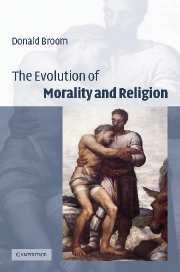Book contents
- Frontmatter
- Contents
- Preface
- Acknowledgements
- 1 Concepts and codes of living
- 2 Cooperation, altruism, reciprocal altruism
- 3 Biological capabilities needed for altruism and morality
- 4 Ideas about morality
- 5 The origins and value of religion
- 6 Other views about the origins of morality and religion
- 7 Social and political consequences of this biological view of morality and religion
- 8 Conclusions
- References
- Species list
- Author index
- Subject index
7 - Social and political consequences of this biological view of morality and religion
Published online by Cambridge University Press: 18 December 2009
- Frontmatter
- Contents
- Preface
- Acknowledgements
- 1 Concepts and codes of living
- 2 Cooperation, altruism, reciprocal altruism
- 3 Biological capabilities needed for altruism and morality
- 4 Ideas about morality
- 5 The origins and value of religion
- 6 Other views about the origins of morality and religion
- 7 Social and political consequences of this biological view of morality and religion
- 8 Conclusions
- References
- Species list
- Author index
- Subject index
Summary
Government, free competition and the maintenance of a moral society
Ideas about the ways in which people should act, their attitudes, and especially their tolerance of other sentient individuals, may be altered by the views presented in this book. As explained by Broom (1981, p. 194):
It is likely that reciprocal altruism is especially important and extensive in man because of our abilities to communicate and to recognise cheats … Many codes of conduct based on reciprocal altruism have been devised in human societies and these have been effective in promoting cohesion within the society which utilizes them. As communication improves, reciprocation is possible from more and more people so mankind becomes more like a single society with weaker and weaker barriers between previously discrete sections.
Given that moral codes in general are so important, how should societies be organised so that the greatest beneficial effect of such codes can be gained?
Hobbes (1651) described human beings as ‘by their nature unrelentingly selfish’. This is clearly not correct. Another idea which is biologically untenable is that all of life is about competition and individuals should be: left to compete with no restriction, educated principally in methods of competing, or encouraged to compete whenever the opportunity presents itself. Preparedness for competition should be balanced with that for cooperation and assistance of others. Strategies for action which stabilise individual relationships and societies are, at least marginally, more successful than those which do not. There are implications of this for both individuals and governments.
- Type
- Chapter
- Information
- The Evolution of Morality and Religion , pp. 204 - 222Publisher: Cambridge University PressPrint publication year: 2003



